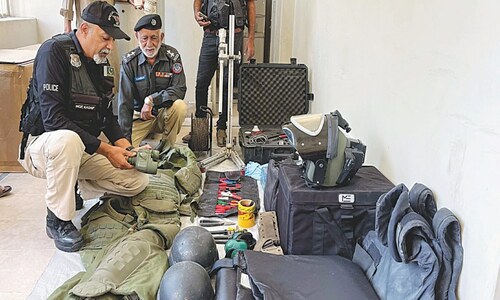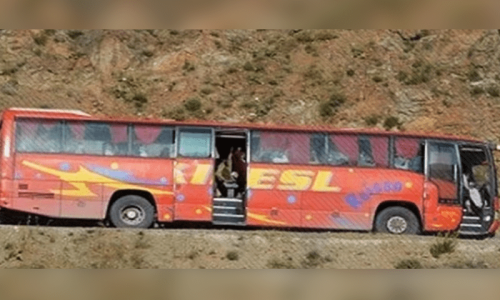KARACHI: Focusing on women as the hardest-hit during disasters and the reason why responses are so gender-blind, the Uks Research Centre (URC) organised an eye-opening and informative interactive discussion ‘Towards a Gender Recovery After Floods’ on Zoom as its eighth Dialogue for Change here on Tuesday.
Uks has done extensive work on gender-sensitisation of media on development issues. During a presentation, the Uks director spoke of several things that come up during their media monitoring work, including women becoming invisible, stigmatised, portrayed in a particular way or blamed.
“Where are the women who have contributed courageously to relief and rehabilitation work? Where are the women who have worked hard to rebuild the lives of their families?” She asked.
She said that after looking at the media coverage of the 2005 earthquake, the 2010 and 2011 floods, annual dengue epidemics, the 2020 Covid-19 pandemic and the recent floods, they realised that it needed to be hammered that the media needed to be sensitive to gender issues as it still showed women as victims by flashing heart-wrenching images of them and their children or just showing them as passive onlookers, incapable of doing anything to help themselves or others or being identified only in relation to the men in their lives, being dutiful mothers, wives, daughters, etc.
Speakers say specific needs of women being ignored in relief items
“Women make up half of the world’s population and they are missing from most narratives. They do so much work, they help in construction, lift heavy construction material while proving that they are not delicate. They are the ones who make places liveable. They know so much. But they are often referred to as bechari [poor thing]. Women raise themselves above misery and problems and their amazing stories need to be told in the media. But other stories about politicians, etc., take more focus in the media instead,” she pointed out.
She reminded that women also had some special needs, which should be reported, too, so that help could be extended to them during disasters such as the current floods. “They need toiletries such as sanitary napkins. If not that, then maybe cotton wool or thin pieces of cotton or linen cloth in relief packages. Many of them might be expecting and they need medicines or special supplements. Being homeless, they also require privacy in the shape of toilets, etc. They also need to be protected against physical abuse and sexual harassment, but the media often turns its back on such issues as it thinks it might look bad to discuss such things,” she said.
Discussed further ground realities linked to the issue, Anis Haroon, representing the National Commission for Human Rights and the Women’s Action Forum, said she was speaking from her own experience after visiting several camps. “I have seen the women doing all the work. Their men just sit on the charpoy as they take care of the children, bring the water, cook and clean. Their men also need to be made aware that if not taking on half of their burden, they should at least share 30 per cent of their work,” she said.
Raheela Saad of the National Disaster Management Authority said she had also seen women and girls carrying around young children in the camps and never a man taking care of children or babies. “And besides tending to their young, the women are also maintaining her vanity,” she said while sharing an incident related to the Iran earthquake when relief packages were being sent there from Pakistan and she insisted to also put in sanitary napkins, which turned into a debate about whether the government in Iran would mind that.
Kaleem Durrani of the Regional Director of Human Rights Commission of Pakistan brought up underage marriages in the camps with parents getting their young daughters married off as they can’t feed so many mouths. “If this is true, then the media should highlight it along with other kinds of sexual exploitation of females due to the floods,” he said.
Dr Wajiha Javed from Getz Pharma diverted attention to the importance of family planning products during disasters. “There is a baby boon after disasters and calamities. And it is not a private issue to be dealt by couples, it is a national issue. There is also a prevalence of HIV seen in such times so there is a need for condoms, too,” she said.
She also said the babies during that time would become malnourished if breast feeding or nursing stations were not available and that the media should talk about that as well. Other than that, there was also a need for birthing stations. “The UNDP had sent health safety kits and supplements for women to help in delivering babies, but instead of reaching them, they reached the markets and are being sold,” she said.
A former Unicef professional, Naseemur Rehman, who has served in many countries in South Asia, said it was unfortunate that gender concerns got ignored more in disasters. “Around 60 per cent of maternal deaths happen during natural disasters and displacement. The risk factors compound in emergencies. Pregnancies are also a risk factor at this time. If an 18-year-old is pregnant, she needs medical staff to deliver her baby, which is the same for anyone over 45,” he said.
He pointed out that emotional response was generous there but flood responders did not have response programmes for women. “They need to be sensitised about this. They ignore high impact interventions and would rather give more than needed blankets or things that people have discarded such as shorts or bikinis,” he said.
“Then while giving food items such as rice, lentils or flour, they forget to also supply cooking utensils so that the people are able to cook their food themselves. With no utensils, the men go and sell the dry food items to buy cooked food from the market,” he pointed out.
Young journalist from Quetta Fizza Kanwal said she had seen people building their homes on land not fit for construction, by nullahs or river banks so that they could get aid from the government when disaster hit. She also said the media had no figurative data and the data they got from NGOs was not authentic.
Researcher Shahrezad Samiuddin and Shaista Yasmeen also spoke.
Published in Dawn, September 28th, 2022













































Dear visitor, the comments section is undergoing an overhaul and will return soon.